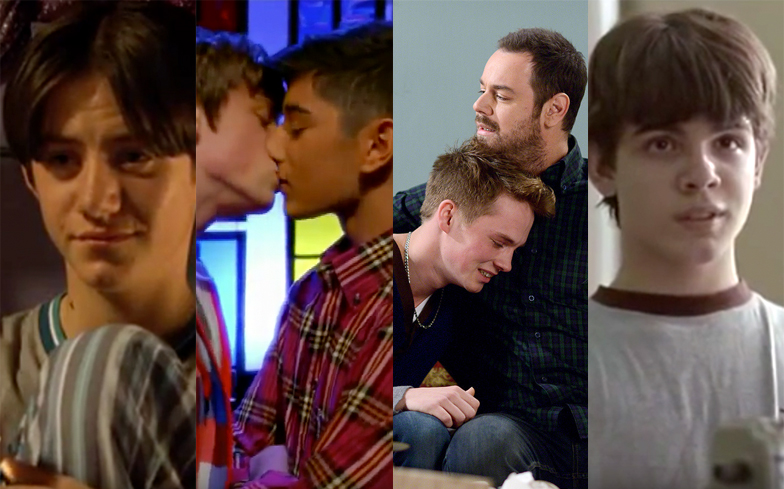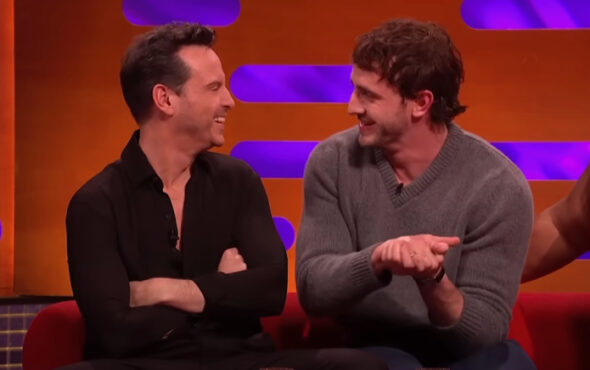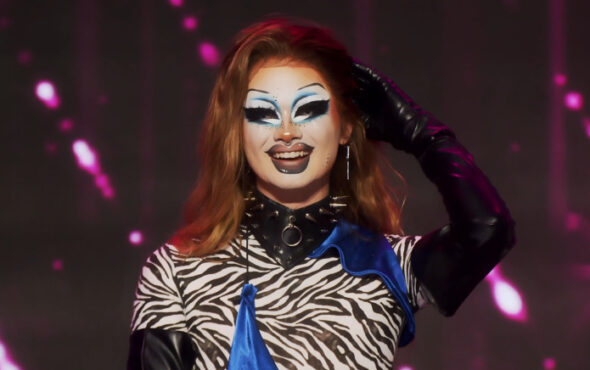
Just as each coming out story in real life is different for everyone, so are those on screen.
There are hundreds of ways to throw open the closet doors and let the light inside. Yes, you often get the same clichés or wank-fantasies that tend to overshadow actual real-life, relatable scenarios – two straight footballer mates falling in love etc – but usually there’s something new to take away every time.
I looked at a selection of coming out stories on screen over the years, from the good to the bad and everything in between.
Please Like Me
Josh, the lead of this charming, yet spiky, Aussie show is something of an anti-hero: he’s a little bit funny-looking, awkward and beyond self-centred. When his very beautiful girlfriend Claire breaks up with him because she thinks he’s gay, Josh realises she’s right and embarks on a journey of self-discovery. Luckily his friends and family are cool with it and a very handsome work colleague of his flatmate’s inexplicably wants to have sex with him. Josh is insecure, overeager, and cruel, at times; he treats his first boyfriend very poorly and deals with his second boyfriend’s closetedness and mental health issues about as sensitively as a lump hammer. While you may need to bite your tongue at how irritating he is, try to ignore that you may have seen a bit of yourself in him, and wonder why the hell these beautiful men keep falling in love with him, the ongoing – and at times much more interesting, to be honest – subplot around Josh’s mother’s mental illness reminds you that people going through this have other problems to deal with. It is not *all* about coming out – life goes on. Also, to add to the hyper-realness of the show: Josh’s underwear is unforgivably horrible.
Agony
Maureen Lipman’s late 70s situation comedy vehicle was one of the first shows on TV to show a gay couple living together relatively “normally”, but it was the 90s revival Agony Again that brought things closer to home, when lead character Jane’s son Daniel tried his best to come out to an oblivious mother. As you would expect in real life, Lipman’ s otherwise usually right-on Jane struggled a little with it – screeching about using condoms before talking about the emotional side, but this was the ‘90s – which is a keen reminder that even the most liberal of values are tested once you bring a little bit of gay sex into the equation. (Six minutes in, and then the very end of the episode.)
Skam (Shame)
I’ve written before about this Norwegian teen drama, currently setting Tumblr ablaze in its third series, with the story of repressed dude-bro Isak, whose latent gay feelings have finally been ignited by handsome newcomer (this is a common theme) Even. Online fandom and shipping, and a few careful overlooking of some flights of fancy aside, Isak’s story has been expertly crafted, from his jealousy over his best friend’s relationship, his averse reaction to any other gay man in his vicinity, secretly looking at gay porn and hookup apps before falling in love and trying to control the fallout. Isak’s reluctance to be gay – which is possibly the most common feeling of all – has been skilfully conveyed by the young actor playing him, still only 17. Most of the best scenes have not involved his passion for Even but his interaction with supporting characters. A powerful scene with older, out and proud gay guy Eskild, where Isak rejects gay stereotypes as “tights and lavender”, assuring he’s not like that before being shot down in flames, is one many of us can relate to, and his difficulty in discussing his feelings with his laddish mates – who react with a mixture of prurient curiosity, indifference and encouragement – feel true to the story and the characters. As the storyline develops, it’s turned out Even has mental health issues, and the focus has become about Isak himself being more accepting of others. It’s a timely reminder that LGBT people are not automatically tolerant and understanding – we’ve all got work to do to be better. Along with tackling problems that feel very current, like social anxiety, casual homophobia and islamophobia and the confines of masculinity, it’s been a long time since teenage sexuality, not to mention the heartbreaking desperation of gay feelings, was portrayed in such a frank and believable way.
Queer as Folk
When we think of the coming-out story in Russell T Davies’ seminal comedy-drama, which for better or worse, changed perception of gay men for ever when it was screened in the death throes of the 90s, we likely think of schoolboy Nathan. Every time he scored a “first”, be it his very first rimming, or being dropped off by last night’s trade, or having his heart broken, we remember our firsts too. But perhaps the more compelling coming-out story was preening, cocksure Stuart, who played hard and fast with the emotions of most off the show’s supporting cast. Outwardly, Stuart was out, proud and living the dream, with a good job, a plush pad, nice car and every gay man on Canal Street at his disposal. But there’s more than one closet to escape from, and, like many of us who flee for the bright lights as soon as we’re able, Stuart wasn’t out to his family. It all came to a head in soapy, explosive fashion, when Stuart’s young nephew began blackmailing him about his double life, and Stuart blurted out his secret randomly, in an angry, foul-mouthed diatribe in front of his entire family. While the speech itself may have been rather fantastical and staged – I just don’t believe anyone would say “I dine at the downstairs restaurant” anywhere other than a Pitbull guest rap on a J-Lo song – its delivery and the desperation behind it may well have rung true for many.
Dawson’s Creek
Was there anything about sporty handsome Jack’s coming out that felt remotely inspiring or authentic? In the 90s, if you were coming out as gay, you had to endure a hell of a lot if misery alongside it, and poor Jack got that in spades, despite being played by the kind of jock who would’ve definitely subjected you to a daily wedgie at school. The one realistic part was that Jack very rarely got so much of a sniff at sex and his early attempts at a relationship were disastrous, but he did at least get a Hollywood-style ending.
The Bill
Not normally known for its sensitivity or realism – there seemed to be a fatal terrorist attack on the station once a year, usually around contract renewal time for the long-suffering cast – the popular police procedural scored a home run with its story of PC Luke Ashton in 2002. The young copper, played by Beautiful Thing’s Scott Neal, was engaged to a female colleague but found himself acting strangely around gay sergeant Craig Gilmore. The relationship between the two, which veered between being at loggerheads and a tense emotional connection around 10 times per episode, came to a head when the couple finally shared a kiss. It was unusual for a primetime ITV show, and viewers were outraged, but all complaints were quickly dismissed. It ended badly, as these things do, with a guilt-ridden one-nighter and Luke being outed by his ex to his entire workforce, but thanks to emotionally charged performances of all those involved, and a truly gripping slow burn of a storyline, it felt authentic enough.
At Home with the Braithwaites
While a comedy-drama about a family who wins the lottery may not sound like the best home for a sensitive coming-out tale, Sarah Smart’s portrayal of ballsy, yet vulnerable, daughter Virginia was outstanding. Poor Virginia seemed to come out to someone every other episode – which is pretty much how it is in real life – and the relations ranged from tearful “I love you’s, eye-rolling “We already knew’s and angry outbursts featuring smashed china. Again, just like real life. The bit where she married her next-door neighbour, had a Bollywood wedding and was widowed when her wife was electrocuted in the bath, however, not so much. But, hey, lesbians on TV – not that usual in 2003. We took what we could.
I Don’t Want to Go Back Alone
Telling the story of blind schoolboy Leonardo, who begins to fall for charismatic newcomer Gabriel when he guides him home after school every day, this sweet Brazilian short packs the full journey into its 17 minutes. We have the obligatory jealous gal pal in the middle, a palpable crush that gets stronger as the film progresses and, while a happy one, a cliffhanger ending. It was so successful it was made into a full-length movie entitled The Way He Looks, with the original cast. Like all schoolboy crushes, it’s sweet, pleasurably painful and powered more through suggestion than actual action – and any guy who fell in love with a schoolmate can tell you how real that is. Nothing ever happens, does it? Sigh.
Ugly Betty
Most coming-out journeys on screen begin well into teenage years, but hit US show Ugly Betty played the long game with the lead character’s nephew Justin. Many of Justin’s traits – a love for fashion, a desire to be an actor, an endless supply of pithy one-liners – may have seemed cliché, but his portrayal of an effeminate young boy in a macho world was touching, sincere and brilliantly played. Despite his family’s immediate acceptance of his behaviour as being totally normal, Justin’s unashamed fabulousness was crushed a few times, as it would be for many of us growing up, but, unlike many, he got his fairy-tale ending.
Hollyoaks
The Chester-set soap is pretty much awash with gay characters in 2016, but it hasn’t always been that way. Lucy Benson’s first boyfriend Daz the DJ was one of the soap’s first gay characters, although his coming-out was quite muddled, with little preamble before the big reveal. The one everyone remembers, of course, is McDean, the love affair between footie teammates – yes, really, they went there – John Paul McQueen and Craig Dean. Their at-first secret relationship – they both had girlfriends, you see – attracted a huge online fandom, perhaps one of the first of its kind. Their teatime bedroom scenes, with one of the lads wearing a vest at all times, were the stuff of legend and had McDean shippers going into regular meltdowns. The journey itself was touching and had elements of realism, with John Paul committed to coming out as gay, but Craig unwilling to define his sexuality by who he slept with – he spent months saying “I’m not gay” before slightly upgrading to “I’m not gay, I’m just in love with a boy”. Reluctance to admit you were gay was nothing new, but a refusal to accept traditional labels was, incredibly, still very rare in 2007. The storyline was an inspiration to many young men who felt the same.
EastEnders
While modern-day Albert Square may not accurately represent the east end of 2016, historically the London soap has been something of a pioneer when it comes to diversity. From Colin and Tony to Sonia and Tina, EastEnders has never shied away from showing every inch of a gay character’s struggle and joy – although perhaps the less said about Della and Binnie, the better. Perhaps the show’s most memorable coming-out journey of recent years belongs to the Carter family, namely then-youngest son Johnny, the promising law student. It was testament to the excellent characterisation, realistic script and strong performances from Sam Strike and, playing against hard nut type, Danny Dyer as dad Mick, that Johnny’s big coming-out scene happened only three weeks after the family were added to the cast. Johnny’s tearful, embarrassed admission, and his dad’s considered and reassuring acceptance – which Johnny had not expected at all – was a welcome change from soap’s usual default of shock and awe when it comes to gay storylines. The journey itself didn’t really belong to Johnny in the end, but his mum Linda, who went against the stereotype of a mother thrilled to have a gay son she could go shopping with, and was instead horrified that her baby boy could be that way, and would be having sex with men. While Johnny’s trajectory since has been a little disappointing, he made an impression that many closeted teenagers sitting at home watching could not ignore.
Shameless
A curious animal, Shameless was a mixture of comedy and tragedy, gritty realism and cartoon fantasy. While you could argue its portrayal of people on council estates as loveable criminals with drug habits was in turns patronising, harmful and class tourism at its peak (and I probably would, because I grew up as one), the show proudly put gay characters at its heart from the very off. Its handling of them, however, was very much a mixed bag. Starting with closeted teenager Ian, having an affair with his married boss at the local corner shop, things improved a touch when they later introduced Mickey. Mickey was part of a family of merciless, and often inept, criminals, who struggled to reconcile his masculinity and propensity for contract killing with the more sensitive aspects of his sexuality and the risk of rejection by his hard-nosed nearest and dearest. The show was not afraid to show gay sex in all its glory – although this seemed more for titillation then a genuine attempt to enlighten – Shameless reminded viewers not all gay characters are middle-class wallflowers with a crush on their teacher. The storylines played out again, and arguably much, much better, in the US version.
Beautiful People
The focus of this 90s-set comedy is undoubtedly Simon, who would grow up to be a fabulous window-dresser at Barney’s in New York, but the star of it, and the far more interesting character is his best friend Kyle – or Kylie. Unabashedly effeminate, with an ogre of a mother who was horrified by her son’s mannerisms, Kylie was a tough cookie never in doubt of who he was. Kyle’s journey – for some reason presented as less complex than that of white best pal Simon, who had a loving and understanding family, albeit a mother in denial – wasn’t explored as much and had little development, but what we did see of it was ultimately more compelling. That said, Simon talking to his mum about her dead gay best friend, which very very nearly leads to a coming-out moment, is a touching scene.
Emmerdale
Another soap, you say? Well, they’re on five times a week and are the most watched TV shows in the country – we can’t ignore them. Emmerdale’s portrayal of gay characters really hit its stride with its first out lesbian Zoe Tate, brilliantly played by Leah Bracknell in the mid-90s, who took precisely zero shit from the gossiping villagers and her brother Chris when it came to her sexuality. The show has come into its own, however, over the last year or so with the relationship between gay Aaron and a heritage character reinvented for the modern age, Robert Sugden. Returning a couple of years ago with a new head and a previously unknown taste for guys – which has since been retconned into the story quite effectively – Robert’s flakiness (so much flakiness!), passion and torment has been the catalyst for some explosive scenes with his on-off lover. Recent scenes have seen Robert label himself as bisexual, and the issues this has caused with his boyfriend, along with some women characters’ attitude to him, has been deftly scripted to expose the prejudices bi people face not just from straight people, but from the LGBT community itself. It is possibly one of the most ingenuous portrayals of bisexuality on screen in recent years, and if you can stand the fact that your favourite character is likely to be killed off at a moment’s notice in any given episode, it is well worth a watch.
Honourable mentions: Todd in Coronation Street (bad); the Iceman allegory in X-Men (good); Jonathan Harvey’s Beautiful Thing (good); Ellen (good); Beth and Margaret in Brookside (OK); Brittany Murphy’s Lisa finally cracking and outing her sibling in Drop Dead Gorgeous (very relatable); David and Keith in Six Feet Under (good); Stephen Carrington in Dynasty (groundbreaking, yet packed with misery).



